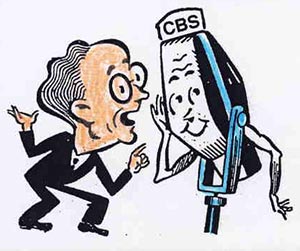|

This story was published in Radio Recall, the journal of the Metropolitan Washington Old-Time Radio Club, published six times per year.
Click here to return to the index of selected articles.
|
|
 FRANK STANTON: FRANK STANTON:
Gentleman-in-Waiting, a Man Dispossessed
by Jim Cox © 2008
(From Radio Recall, December 2008)
A 1976 newspaper account caught my attention not long ago that spoke volumes about the nefarious shenanigans transpiring in the background at CBS in the last century. Not only did they jeopardize progress, they thwarted more than one individual’s ambitions. Titled “The House That Paley Built—And Keeps,” it ran in The New York Times 14 years before tycoon William S. Paley’s death. It hinted that Paley held the network in a stranglehold to implement his wishes to the detriment of an empire he fashioned and turned into near idol worship. Despite the accolades that are awarded him deservedly, Paley was guilty of an inbred organizational view. On occasions, it separated him from reality.
In his determination to control CBS until his dying breath, Paley killed the proverbial goose that laid the golden egg. While he expressed hope for an orderly transition of power to a worthy successor who could build upon the foundation he laid —perpetuating the legacy for which he is credited—he acquiesced. Instead of entrusting his prized possession to the man who stood by him for more than a quarter-century running CBS’s internal operations—a network spokesman who rescued the industry from the clutches of the feds on more than one occasion—Paley rewarded him by forcing him out. It had a deafening ring of “no good deed goes unpunished.”
To Frank Stanton, his right-hand man and heir apparent, Paley applied his “rule of 65,” showing him the door after years of training for Camelot. Paley bade farewell to everybody at CBS at 65, in fact—except himself. At 89, he persisted as chairman of the board, until death finally intervened.
As a result, handing off the business to a competent insider never came about. In less than five years following Paley’s demise, CBS passed from private enterprise to corporate control, something its czar hadn’t prepared for. While the best laid plans often go awry, no plan often means the train falls off the track.
Back to Stanton....In this scribe’s opinion, he never got his just due. Never the subject of any full-length biography, he was limited to time served. Awarded a generous parting check accompanied by little fanfare, he passed through the CBS portals for the last time after pacing its halls for four decades, familiar with all its warts and treasures. A man dispossessed, Stanton could have heard the strains of “This Nearly Was Mine” idling softly in the background from Rodgers and Hammerstein’s South Pacific.
Born March 20, 1908, at Muskegon, Michigan, Frank Nicholas Stanton was the son of a woodworking and mechanics teacher. At an early age, the family relocated to Dayton, Ohio, where the youth learned electronics at his dad’s workbench. Majoring in zoology and psychology at Ohio Wesleyan University, he intended to pursue pre-med courses upon his graduation in 1930. But med school was out of reach for him in the depths of the Great Depression, so he accepted a scholarship to Ohio State University to study psychology.
Earning a master’s in 1932, Stanton subsequently taught psychology while pursuing the doctorate at Ohio State, studying ways to quantify mass radio audiences. During those pursuits he invented a precursor to the Nielsen audimeter measuring device, installing the apparatus within a radio receiver to tabulate what programs were heard. CBS research director Paul Kesten, then presiding over a department of only two individuals, was so impressed with Stanton’s project that he offered him a $55-a-week job. The day after collecting his doctorate in 1935, Stanton and his wife left Ohio for New York where he was to spend his career.
His novel contributions in research made a hit at CBS. In those days he focused on audience measurement and program ratings, geographical studies of CBS station coverage and probed into radio’s effectiveness in selling goods. In 1938, he was boosted to his first leadership capacity as director of research, an area soon comprised of more than 100 staffers.

In 1941, Stanton was promoted to director of advertising, and by 1944, vice president. In 1945, he was elected general manager and a CBS director. The following year, he was appointed president and chief operating officer, succeeding Paley, who was elected chairman of the board. Stanton served in that key role to 1971 when he was named vice chairman and chief operating officer.
Across the years he collected five Peabody awards for excellence in broadcasting along with two Emmys. Upon his retirement in 1973, he pursued myriad opportunities in business, education, government and the arts, though out of the glare of the spotlight.
While Stanton played a pivotal role in CBS’s rise, it should be understood that he did so notwithstanding a connection with Paley that was often strained and bewildering to those inside the walls at CBS. Sally Bedell Smith’s memoir of Paley, In All His Glory, offered an introspective not found elsewhere: “Temperamentally, the two men were opposites: Paley, the man of boundless charm, superficially warm but essentially heartless; Stanton, the self-contained Swiss whose business acumen, decency, and understated humor endeared him to his colleagues.
“Paley had a restless, readily satisfied curiosity while Stanton probed more deeply and was interested in a broader range of subjects,” Smith allowed. “Paley acted from the gut; Stanton from the brain. Paley could be disorganized and unpredictable. Stanton was disciplined and systematic. Yet their relationship worked—largely due to Stanton’s forbearance and diligence.”
Stanton didn’t feel secure in the glamorous social whirl that Paley dominated.
The two men didn’t fraternize socially. Smith wrote that Paley resented Stanton’s refusal to invite him to his home, dubbing his associate “a closed-off, cold man.” Stanton was, nevertheless, admired by politicians, businessmen and fellow broadcasters as a principled executive with high aspirations. The industry turned to him numerous times to lead their battles against government involvement in radio and television programming.
A print journalist assessed him as “the industry’s most articulate and persuasive spokesman.” In one of those battles—Stanton’s most public fight for free speech—he withstood governmental intrusion in a watershed crisis. He defied a U. S. House of Representatives subpoena for out takes of a CBS documentary, a move that affirmed him as the leading proponent of electronic journalism’s equivalent status with print under the First Amendment. Likening the out takes to print reporters’ notebooks, as TV cameras rolled, he told the full U. S. House he wouldn’t release those out takes from “CBS Reports: The Selling of the Pentagon.”
The 1971 investigation exposed a mass push by the Pentagon to buttress the Vietnam War. While the defiance could have put Stanton in jail, following two days of hearings, the House voted 226-181 not to hold CBS and its president in contempt.
As a man of perceptive scrutiny, by the time he ascended to the CBS presidency in 1946 Stanton clearly understood that TV would be the next venue on the broadcasting horizon. While Paley was slow to embrace it, Stanton forged ahead. When Paley pulled off the coup in 1948 and 1949 that shifted legendary radio headliners from NBC and ABC to CBS’s roster, Stanton observed: “I never heard Bill talk about using the stars for television at all. For him in those days it was all radio. His postwar idea was simply to get control of radio programming. He never talked about television. He didn’t see the light until well after the early days … he didn’t pick stars with any idea about leaping into television.”
When Stanton was budget-planning for TV for the first time in 1947, he urged Paley to participate. The chairman shrugged, feigning an overloaded schedule. He wouldn’t be a party to anything that smacked of displacing radio. It would take enormous profits from I Love Lucy, Arthur Godfrey’s Talent Scouts, Gunsmoke and similar cash cows for him to thaw.
Upon Stanton’s retirement, top company management extolled him for his “brilliant” career, exclaiming that he brought to CBS and the broadcasting industry “deep intellectual insight, uncompromising integrity and a devotion to excellence.” The man who played second fiddle at CBS for so long died at 98 in Boston on December 24, 2006, “a genuine hero of the fourth estate,” according to ex-newsman Walter Cronkite.
In a puff piece released by CBS following Stanton’s passing, Cronkite lauded his former colleague: “It was William Paley’s sagacity and great good fortune to bring along as his chief executive Frank Stanton, who recruited over the years the broadcasters, producers, reporters and writers that constituted an all-star cast, from Ed Murrow on down, that burnished CBS.”
Internal strife played a particularly large role at CBS during the waning days of Stanton’s career. In violation of his stated rule, Paley refused to retire. He imposed that compulsory mandate on others, making the March 30, 1973, retirement of his logical heir, Stanton, obligatory. That was, in many respects, an unwise decision that set the broadcast empire on a course of uncertainty that negatively characterized it for a couple of decades. It well may have played a part in determining CBS’s long-range fate, ultimately handing it to outside interests.
With Stanton’s departure, Paley installed and quickly forced resignations of a trio of successive president-chief executive officers: Arthur R. Taylor (1972-1976), John David Backe (1976-1980) and Thomas Hunt Wyman (1980-1986). CBS, Inc. was hardly a serene place in those days. It was “agitated” over who would eventually follow Paley, a source disclosed. Anxiety about the succession began to threaten the web’s independence. Declining ratings left CBS vulnerable. The biggest threat came from a takeover bid by cable magnate Ted Turner.
Wyman succeeded Paley as chairman, president and CEO in 1983 but was out by 1986 with Paley, then 84, returning as acting chairman. CBS turned to Loews Corporation president Laurence Alan Tisch, who owned nearly a billion dollars’ worth of CBS stock, as acting CEO. By January 1987, the CBS board made both Paley’s and Tisch’s appointments permanent. None of it bode well for a company embroiled in unmitigated turmoil for more than a decade.
That same year (1987) Tisch instituted massive cuts in budget and personnel while selling recording, magazine and publishing interests. At the same time, he habitually alienated many within the ranks who should have been his strongest allies. Not long afterward, in 1990, Paley died, leaving a once-proud first-rate broadcast empire in alarming disarray and wide-ranging upheaval. It was a sad finale for a lifelong pursuit that might have experienced a far different transitional outcome had it been handled differently.
Tisch, then 67, was named chairman of the board in December 1990, in addition to his assignments as president and chief executive officer. In less than five years, CBS, Inc. was sold for $5.4 billion to Westinghouse Electric Corporation, ending CBS’s 68-year history as an independent venture.
A postscript to Stanton, the forgotten man in the midst of all this upheaval, may have been best expressed in poet John Greenleaf Whittier’s Maud Muller: “For of all sad words of tongue or pen, The saddest are these: “It might have been!”
|